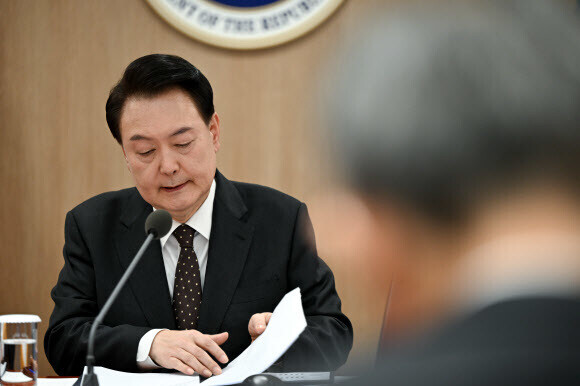hankyoreh
Links to other country sites 다른 나라 사이트 링크
Yoon threatens punishments “several times stronger” in response to N. Korean provocations

South Korean President Yoon Suk-yeol responded Tuesday to North Korean leader Kim Jong-un’s recent remarks characterizing inter-Korean relations as being between “two belligerent states.”
“The North Korean regime is itself admitting that it is an anti-nation, anti-historical group,” Yoon said.
In response to North Korea’s recent artillery fire and ballistic missile testing, he reaffirmed his intent to respond to force with force, stressing that “if there are any provocations, the punishment will be several times stronger.”
While presiding over a Cabinet meeting at his presidential office in Seoul’s Yongsan area that day, Yoon observed that “North Korean authorities have defined inter-Korean relations as ‘the relationship between two belligerent states’ rather than one between a single people.”
At a plenary meeting of the Workers’ Party of Korea (WPK) Central Committee on Dec. 30, Kim referred to inter-Korean relations as those between “two states hostile to each other and the relations between two belligerent states,” declaring that reunification with the Republic of Korea was not achievable.
On Tuesday, the Korean Central News Agency quoted remarks made by Kim the day before in a policy speech at the 10th session of the 14th Supreme People’s Assembly.
“I think it is right to specify in the relevant paragraph of our constitution that [. . .] education should be intensified to instill into [the North Korean people] the firm idea that ROK is their primary foe and invariable principal enemy,” he was reported as saying.
On Sunday, Yoon said that South Korea would punish North Korea for provocations, mentioning its intermediate-range ballistic missile testing and artillery fire, saying that North Korea’s actions are “political provocations meant to make the [South Korean] public uneasy and divide the Republic of Korea.”
“The current administration in the Republic of Korea is different from any past one. If there are any provocations by North Korea, the punishment will be several times stronger,” he added.
Asserting that the “conventional ‘disguised peace’ tactics of threatening either war or peace no longer work,” he stressed that “false peace achieved by bowing to threats of provocations only places our security in greater danger.”
Additionally, he directed the Ministry of Unification to establish a dedicated day for celebrating North Korean defectors.
“The ones threatening the Republic of Korea are the North Korean regime, not the North Korean people,” he said.
His remarks read as a reaffirmation of his previous policy of hard-line responses.
With his remarks coming around three months ahead of a general election, some critics have suggested he may be driving up inter-Korean tensions to suit political aims.
“This appears to be intended for domestic political consumption, where he’s trying to rally conservatives and pull in moderate votes by adhering to a hard-line stance on North Korea ahead of the election,” suggested Cho Seong-ryoul, a visiting professor at the University of North Korean Studies.
“With inter-Korean relations currently facing a security dilemma where some have even been talking about the danger of a military clash, President Yoon’s remarks only fuel the fire,” he added.
The Ministry of Unification and the Ministry of National Defense echoed Yoon’s message.
“North Korea’s actions have been political provocations meant to divide South Korean society, and there has been basically no change from its previous course in terms of the ultimate aim of achieving a communist unification through armed force,” the Unification Ministry said.
“We will respond forcefully and resolutely to North Korea’s brazenly misleading characterization of inter-Korean relations and its aggressive attempts at armed provocations,” it added.
Appearing that evening in a radio interview with KBS, Minister of National Defense Shin Won-sik said, “A barking dog doesn’t bite.”
“If North Korea makes the wrong decision, it will come to an end in the shortest of times,” he warned.
By Bae Ji-hyun, staff reporter
Please direct questions or comments to [english@hani.co.kr]

Editorial・opinion
![[Editorial] Intensifying US-China rivalry means Seoul must address uncertainty with Beijing sooner than later [Editorial] Intensifying US-China rivalry means Seoul must address uncertainty with Beijing sooner than later](https://flexible.img.hani.co.kr/flexible/normal/500/300/imgdb/original/2024/0517/8117159322045222.jpg) [Editorial] Intensifying US-China rivalry means Seoul must address uncertainty with Beijing sooner than later
[Editorial] Intensifying US-China rivalry means Seoul must address uncertainty with Beijing sooner than later![[Column] When ‘fairness’ means hate and violence [Column] When ‘fairness’ means hate and violence](https://flexible.img.hani.co.kr/flexible/normal/500/300/imgdb/original/2024/0516/7417158465908824.jpg) [Column] When ‘fairness’ means hate and violence
[Column] When ‘fairness’ means hate and violence- [Editorial] Yoon must stop abusing authority to shield himself from investigation
- [Column] US troop withdrawal from Korea could be the Acheson Line all over
- [Column] How to win back readers who’ve turned to YouTube for news
- [Column] Welcome to the president’s pity party
- [Editorial] Korea must respond firmly to Japan’s attempt to usurp Line
- [Editorial] Transfers of prosecutors investigating Korea’s first lady send chilling message
- [Column] Will Seoul’s ties with Moscow really recover on their own?
- [Column] Samsung’s ‘lost decade’ and Lee Jae-yong’s mismatched chopsticks
Most viewed articles
- 1[Editorial] Transfers of prosecutors investigating Korea’s first lady send chilling message
- 2[Exclusive] Unearthed memo suggests Gwangju Uprising missing may have been cremated
- 3[Column] US troop withdrawal from Korea could be the Acheson Line all over
- 4Xi, Putin ‘oppose acts of military intimidation’ against N. Korea by US in joint statement
- 5[Column] When ‘fairness’ means hate and violence
- 6[Editorial] Intensifying US-China rivalry means Seoul must address uncertainty with Beijing sooner t
- 7‘Shot, stabbed, piled on a truck’: Mystery of missing dead at Gwangju Prison
- 8Spotlight turns to Hyundai Group Chairwoman’s visit to North Korea
- 9[Column] Samsung’s ‘lost decade’ and Lee Jae-yong’s mismatched chopsticks
- 10[Column] Will Seoul’s ties with Moscow really recover on their own?